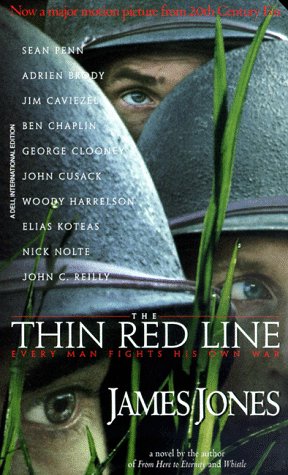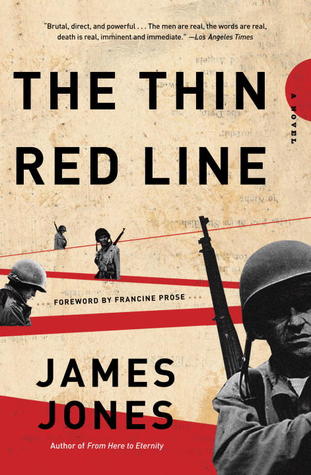A true masterpiece and one of my favorite novels. Although it has all the realistic, gritty detailing that any novel recounting World War 2 Guadalcanal should have, it is so much more. The reader will indeed learn which gun is which and which rank is which. They will understand what needs to happen to take a hill. They will know what a crowded ship full of men will smell like. They will come to understand the practical intricacies of making war. But, as anyone who viewed the recent version of the film will know, the story is not one based on narrative but one based on a specific philosophy: we are all, as humans, forever destined to never truly understand one another, we are forever destined to never truly achieve the kind of empathetic meeting of heart & mind & soul that we may yearn for - a yearning we may not understand or even recognize. War is, if it is anything, an insane metaphor for that lack of understanding, that true lack of connection, and to be a part of that metaphor is to be, in a way, as insane.
This is a novel of many voices, each individualized and each specifically unique and amusingly detailed. And yet there is a similarity to the themes that emerge from the thoughts of each of the characters, whether they are trying to understand their brothers, their girls back home, their commanders, their enemy, their next target, or the war itself: the feeling of distance. It is a melancholy and confusing feeling. Each one blunders through his life in his own way, barely grasping what is happening around him, barely grasping what is happening inside himself as well. The novel is epic in its depiction of war, but it is intimate in its depiction of the levels of mystery within each of us and between us as well.
It is surprisingly funny at times. James Jones has a mordant voice and he knows the ridiculousness of men, how amusing our little concerns and irritations and idiosyncrasies can be when depicted at times gently but more often pointedly. He also knows that throwing dozens upon dozens of characters in the narrative will confuse and annoy the lazy reader – but how else to illustrate the confusion of wartime? The coming and going of bodies, of places, of times that all blur together. Jones himself was a WW2 veteran, and so the details are impressively laid out – but what is even more impressive is the poetic, sorrowful mourning that is suffused throughout the novel, one that builds and builds and builds. It is hard to imagine the number of his fellows he saw slain, and how it impacted him. But beyond that, to see the melancholy within the man, not just the soldier, not just the circumstance? He is the rare author I would love to have known, and yet the idea of his experience and his sadness is so intimidating, it makes me feel like less of a grown man when thinking of the person who could write all of this down. What have I done in my life in comparison?
It is interesting to compare the film with the novel. The theme of the distance between humans is there, as is the idea of many narrative voices recounting many different things but all ending in despair over our lack of ability to truly understand ourselves, the world, each other. But Malick widens the melancholy even further by including his usual theme of man’s distance from nature as well. It works beautifully. Two character differences stand out: Pvt Witt and Cpl Fife.
 In the film, Pvt Witt is played by James Caviezel as a beatific savior of men, spiritually connected to nature and prone to daring displays of bravery. In the novel, Witt is a spiteful hick, also prone to daring displays of bravery, but also an unrepentant racist towards all non-whites, and is filled to the brim with petty contempt towards all forms of authority. I like both portraits, but the novel’s Witt seems so much more human, so much more real. You don’t have to be a saint or even particularly likeable to be brave, to save lives, to accomplish daring deeds, to be loveable. He is a hero, ignorant redneck and all, precisely because he is not particularly heroic in thought – only in deed. He comes through, again and again.
In the film, Pvt Witt is played by James Caviezel as a beatific savior of men, spiritually connected to nature and prone to daring displays of bravery. In the novel, Witt is a spiteful hick, also prone to daring displays of bravery, but also an unrepentant racist towards all non-whites, and is filled to the brim with petty contempt towards all forms of authority. I like both portraits, but the novel’s Witt seems so much more human, so much more real. You don’t have to be a saint or even particularly likeable to be brave, to save lives, to accomplish daring deeds, to be loveable. He is a hero, ignorant redneck and all, precisely because he is not particularly heroic in thought – only in deed. He comes through, again and again.In the film, Cpl Fife is reduced to a couple cameos by Adrien Brody, standing distraught by a soldier’s corpse or looking terrified during a river crossing. In the novel, he is so much more: a dissection of the falseness of the concept of “cowardice” during war. He is full of fear, he calls himself a coward, each path he chooses is one that has self-protection at its core; and yet his depiction is entirely sympathetic and rational: what sane man isn’t a coward when it comes to the insanity of war? Who wants it, who wants to be in it? It is not something to run to, it is something to run from. Fife is the secret hero of The Thin Red Line, the rational man not understanding the irrational world around him, and rejecting any attempt to bend him to that irrational world’s rules. I can see how that character would not translate successfully to audiences yearning for heroes, and so Fife in his entirety barely makes it to the screen.
The book’s great success may not just be in its depiction of the distance between humans, but in the illustration of war as the ultimate insanity. As we all know, World War 2 was the Good War, the one in which we all should be proud, the one with truly golden heroes and truly evil villains, the one we all are glad was fought and would have fought in if we could. We had the right reasons after all; at least that is my own perspective. But a good war is still war, and war entails the deaths of the young, the destruction of lives and of love, of cities and of countryside, of innocence, of tradition, of everything. So why do we love it so?

No comments:
Post a Comment